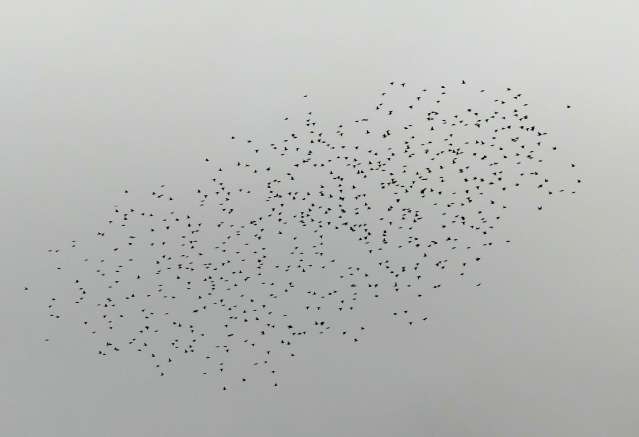What follows is a post in defence of poetry as a defence against Artificial Intelligence. Regular programming will resume tomorrow. This thought came to me on my walk up the hill today, and I wanted to worry it a bit: “The myth, the language that human bodies receive from the Earth (that is also their body, in the form of their bodies)…
No, That is Not a Virginia Creeper
…is a secret language, closed off to rocks, mountains, stars, and artificial intelligences, unless we offer them entrance.” Simple enough, but it hides a certain amount of disquiet, based on the observation that in ancient practice a riddle is a test of whether an applicant is ready for inclusion into a community of secret knowledge, or whether the applicant must die, or otherwise remain in ignorance, closed off from either community or power, from the Saga of tribe. One could always refuse the test, but once committed one was changed by the experience. But we don’t need to get too complicated about it. This is bodily knowledge, after all, or the way the body and the mind meet. They meet here, or, rather, leave together. 
A machine can analyze that meeting if it can statistically compute millions of such meetings, but in the end it can’t say where they go, unless they choose to express themselves in machine language, like Eckhardt Toll, here:

Sure.
In the end, soothed by automated jargon, it will speak to the database-dependent methods in which it has been trained. It would, thus, be best to avoid standardization, or to use it as a screen. One will be read. Resistance, however, is easy, because the script is simplistic, and what is read might likely be a screen, as specifically designed to confound the machine as Facebook ads are designed to reach into human brainstems and amputate later evolution. Here’s a picture, then, for Facebook to compute, just to keep it happy. It won’t have a hard time. One must please the audience, after all.



Still, in the USSR (Soviet Russia) and the DDR (the old East German communist state), the most successful playwrights and composers concealed political ends within secretly-coded riddles, either musical quotations, in the case of Shostakovich, or surreal clowns, in the case of Stefan Schütz. If overgrown adolescents like Elon Musk (dangerous as they are) insist that humans must become cyborgs to prevent themselves from becoming house pets to machines, he has overlooked a few things. For one, humans aren’t thinkers. They are profoundly irrational and have a strong capacity for resistance and predation, even self-predation, that is peculiarly tangled with love and disdain. The darned things have the capacity to be improvised explosive devices, for good or bad, but which, eh? As I said, though, it doesn’t have to be complicated. Poetry is a riddle like this. Here’s some, from an unpublished manuscript in process about wine terroir:
Aqueducts, a kind of aboveground qanat that looks like an Autobahn bridge, were the usual thing in Germany, though, where water comes in from Holland in endless clouds that roll overhead like schools of herring, so close it’s as if you could net them and bring them down. Usually they join together and turn the whole sky to water the same colour as the mud flats of the North Sea. Accordingly, the problem in Pölich is not transporting water but gathering it. Hence the qanat — on the observation that drought can be caused by rock, instead of by weather. It rains the dickens in Pölich, but there is simply so much shale on the hill that there’s hardly any dirt. In the whole valley between Trier and Koblenz, most of the earth’s surface is just the rocky channel that the melting glaciers left behind when their meltwaters carried the clay of the Eiffel Mountains out to Rotterdam and Hellevoetsluis.
I had some fun. I expect it’s largely unreadable. Still, thirty years ago millions of people could read a text like this. Now that machine-reading is dominant, though, not so many. So, like, I ran it for a test with the robots. One cloud-based software suite gave it a complexity factor of 93%. I beamed. Another identified 36 topics (in 160 words!), including “oil shale” and “tanker freight” and “Argentina,” which aren’t there at all. It identified the main topic as “ancient technology,” but missed the real, non-linear topic. One could severely mess with this software. One is reminded that in the age of riddles, even in the 18th century, poetry was the means by which the aristocracy was trained to administrate their states, in a governmental system in conflict with a church that insisted on more linear methods of thought and obedience. The old masters rose to prominence by their ability to communicate and resist at the same time. The post-communist catholics of the former DDR know how to do this as well, within a still-extant communist and still-extant Nazi system. They do it with humour, as do the street artists of Dresden and Weimar, who probably don’t even attend their churches (Just a guess.)

Fill in the Blanks (in the lower right.)
Exquisite Anarchist Graffiti from the Dresdener Neustadt. With a pornographic communist tickle feather that is probably a Neo-Nazi taunt.
A cottonwood tree, with two ages of bark, is a good example of a riddle of this kind, or, rather, the impulse behind a riddle, that reveals its secret language when asked. To a machine, it is likely as inscrutable as the language of blue whales is to humans. Given that this is the age of information…
… we could say that thistle (the poor machine, and its machine-thinking programmers, understood ‘thistree’ as ‘thistle’, but now that I have corrected it, it’s going to weigh that into future decisions, I’m sure) is a particularly dangerous riddle for Artificial Intelligence, as the content of the image is susceptible to being read as an on-off binary numerical sequence, which AI really loves, although there are hundreds of other factors at play and the point of focus may not be the actual point of focus, or it might be open, and “reading’ may not be at play at all. To answer that, you will have to look into your body. You might have to go for a walk. 
Nonetheless, a machine reading this, or even a human trained to read like a machine through schooling and novels is going to fail at this reading, just as WordPress’s self-taught virtual robots are convinced that “thistree” is “thistle” yet that “thist” (the beginning of the same clumsy typing over-run) is “this.” At best, we can expect machines to analyze colour-based responses, or responses based on shape and form, and to analyze patterns in terms of a falling series of statistical probabilities of significance (but never, perhaps, the lack of meaning.) At worst, we can expect a machine to use these images as proof that humans are incapable of thought (as coded into the machines.), in contrast to the meaning-driven thought parameters taught to them by their programming masters, to whom things do have meaning (Except the Russians. They seem to be angry at the Russians for being “mean”, without the “ing.” Or something.)
The kicker is that people have trained these machines, people whose bodily and cognitive thinking meshes at a machine level, due to a variety of influences, including environment, socialization, industrialization, book-learning, bad schooling, drug culture, art, and so much more. Before there were artificial intelligences within machines, there are artificial intelligences within people, built by factors that are largely environmental (environment, socialization, industrialization, book-learning, bad schooling, drug culture, art, and so much more). They cannot be un-taught, but they can be repurposed, and that is what we are doing here: providing entrance into a deeply coded, publicly accessible language capable of extending thought and the power of human bodies, and from time to time, riddles, such as this:

The knowledge of how to decode them exists. Your body knows. So does mine. I won’t betray the secret. The machine can see what it likes. Oh, right, here you go, Google:

Elon Musk, this is chess.
Categories: Arts, Nature Photography, Science














Now that is a glorious nemesis!
LikeLike
It’s time for a book: “I, Human”
>
LikeLiked by 1 person
Yes! It struck me that we need to face the challenge. Why not dispose of the unpleasant mess that is the human race and replace it with cyborgs? Is there a stronger argument in favour of keeping the human race than the mere fact that I would find it unpleasant, either to be exterminated or to be re-engineered. The enthusiasm for a form of eugenics that would eliminate the poor began a long time ago.
LikeLike
Humans have the capacity to integrate in an organic way with the planet. Cyborgs do not. They have a way of integrating with systems. The question shouldn’t be: to become cyborgs or not, but to be bound to limiting systems or not, or, better, to include the earth in our ways or not, and if not, then there is no room for humans, either, but if yes, then there is room for myriads of creatures. This was a choice laid down thousands of years ago. Sidestepping this choice of Free Will is not going to eliminate the problem bound up with the choice. The Cyborgian adventure is being led by a group of alienated humans, living in zoo environments. In effect, the environment has already made them cyborgs, and the increasing rate of planetary destruction is a sign of the poison at the heart of that environment, and the adaptations that humans organically make to fit into it. It’s a fantasy. On that point, though, you’re right. Humans sucker for their fantasies, a lot. It’s a terrible mess. The old control systems are gone, and the new ones — dystopian ones — are a response to increased activity. If this control system replaces humans, it will still be dystopic.
>
LikeLike
Dear Harold, If you type http://www.justfarmers.wordpress.com on the top ribbon you’ll see the archives. (If you go through Google you may encounter a farmers’ dating site!). I’m starting my fifth year on this labour of love. cg
On Wed, Jan 17, 2018 at 11:11 PM, Okanagan Okanogan wrote:
> Harold Rhenisch posted: “What follows is a post in defence of poetry as a > defence against Artificial Intelligence. Regular programming will resume > tomorrow. This thought came to me on my walk up the hill today, and I > wanted to worry it a bit: “The myth, the language that human bo” >
LikeLike
Thanks! Kelly Shepherd has tipped me off on this, too. Cheers.
>
LikeLike